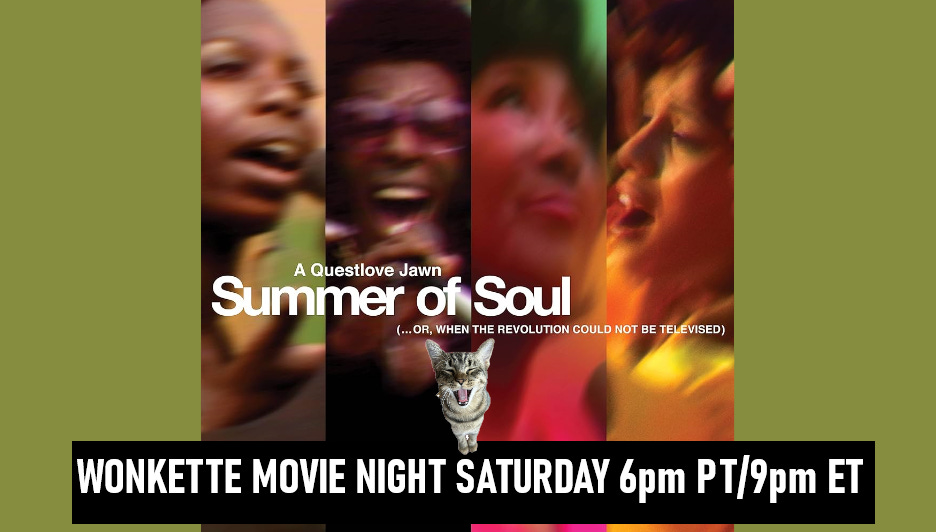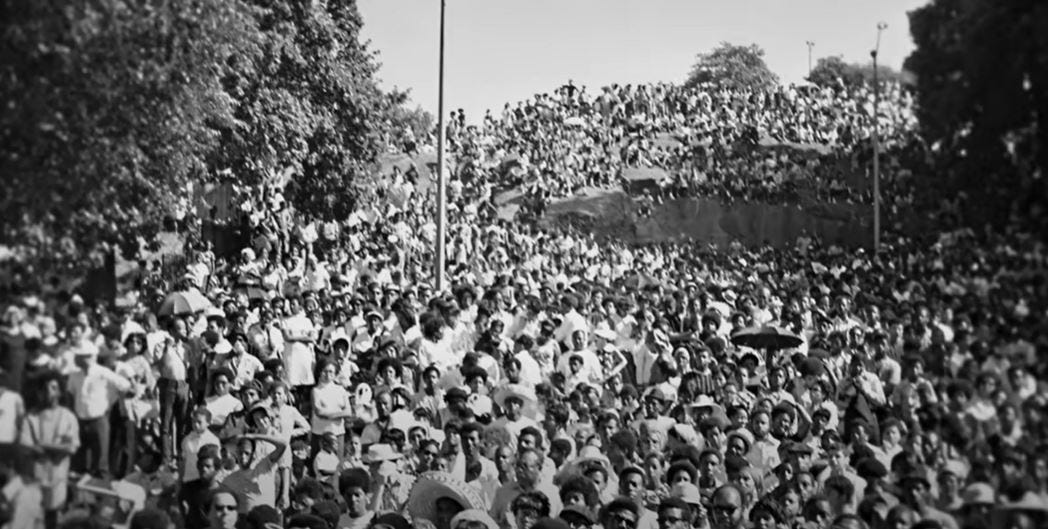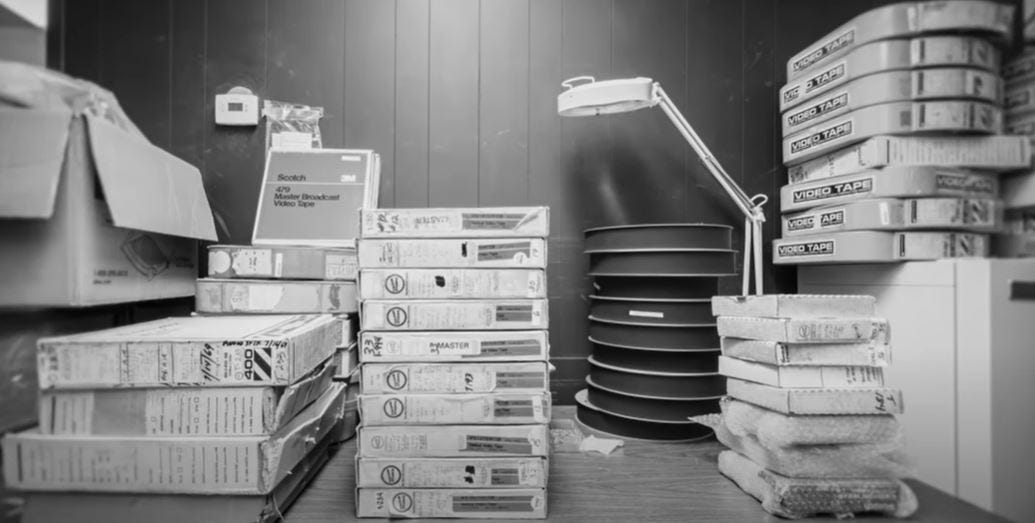Wonkette Movie Night: Summer Of Soul
"In 1969, the same summer as Woodstock another festival took place, it was filmed but never seen. Until now."
To start Black History Month off we have this amazing documentary by Questlove. Summer of Soul takes you on a journey, showing the connections between music, activism, culture, and humanity. Against the backdrop of a changing world in 1969, producers assembled a festival for the ages.
No, not that one.
Over several amazing weekends the Harlem Cultural Festival brought over three hundred thousand people together in Mt. Morris Park, later renamed Marcus Garvey Park to hear music and surround themselves with community and love. Six concerts filled the summer air with beautiful sounds between June 29 and August 24.
LIFE called 1968 The Year That Changed the World.
Assassins with guns killed Martin Luther King, Jr. in April and Bobby Kennedy in June, the Vietnam War raged on and anti-war protests spread across the country. From TIME: Behind the Anti-War Protests That Swept America in 1968
Al Sharpton says of that time,
“People were afraid of the anger and rage boiling over.”
Tony Lawrence, the director of the Harlem Cultural Festival said of the festival being allowed to proceed,
"It may very well have been to keep Black folks from burnin' up the city in '69."
They needed support from New York City and someone to provide the finances. They weren't certain the police would show up to provide security so the Black Panthers assisted in keeping it safe. Mayor John Lindsay was running for reelection and considered himself a friend to the Black community. He was supportive of the festival and appeared on stage with Tony Lawrence, who called him our blue eyed soul brother.
Hal Tulchin, the director and producer of the festival knew they needed corporate support,
"We know we cannot let this enormous array of talent not be taped."
A surprising sponsor was found, Maxwell House Coffee.
The Harlem Cultural Festival was filmed but after fifty years forgotten in a basement, Questlove brought the films to the public, taking forty hours of tape and editing it down to just two.
It seemed like an impossible plan, bringing all this talent together for free concerts in a small park in the middle of Harlem. But they did it. And the people came.
Musa Jackson, a child at the time, reminisced about the festival,
"All I remember is going to this amazing concert in the park. And there was just a sea of Black people. People were selling food. Mom was cookin'. She had her grill, chicken, mac 'n' cheese, maybe some greens, lemonade, Kool-Aid... It was the ultimate Black barbecue."
Black style was also changing, with Afrocentric fashion gaining in popularity. They wore dashikis and had afros. They celebrated.
Interspersed between the footage of musical performances are news clips and interviews reflecting on how the music was a part of Black culture and the tumultuousness of the era.
Reporter Charlayne Hunter-Gault spoke of a significant shift in the media,
"In 1969 I was working at the New York Times, and I spent a lot of time in Harlem. And for the first time, I wrote "Black" instead of "Negro" in a story, because I listened to the community. I listened to the people calling for change. But some white editor changed my wording from "Black" back to "Negro." I was so upset I dictated an 11 page memo calling for the change. And the editor, Abe Rosenthal said, "Fine, that's what we're gonna do." From that point on, at the New York Times people of color, this color, were referred to as Black."
Stevie Wonder was 19 years old and did not hold back on being involved in politics, society's issues and encouraging people to vote. This quote from him is something we can all use in our lives.
"I never wanted to let my fear put my dreams to sleep."
Summer Of Soul was directed by Ahmir "Questlove" Thompson. Produced by Joseph Patel, David Dinerstein and Robert Fyvolent.
Here’s the set list.
Stevie Wonder: It’s Your Thing
The Chambers Brothers: Uptown
B.B. King: Why I Sing The Blues
The 5th Dimension: Don’tcha Hear Me Callin' To Ya
Aquarius/ Let The Sunshine In
The Edwin Hawkins Singers Featuring Shirley Miller: Oh Happy Day
Pops Staples & The Staple Singers: Help Me Jesus
Prof. Herman Stevens & The Voices of Faith: Heaven Is Mine
Ben Branch, Mavis Staples and Mahalia Jackson: Precious Lord
David Ruffin: My Girl
Gladys Knight & The Pips: I Heard It Through The Grapevine
Sly & the Family Stone: Sing A Simple Song
Everyday People
Mongo Santamaria: Watermelon Man
Ray Barreto: Abidjan
Pops Staples & the Staples Singers: It's Been A Change
Redd Foxx and Moms Mabley: Jokes about the Lunar Landing.
Stevie Wonder: Shoo-Bee-Doo-Bee-Doo-Da-Day
Max Roach: It's Time
Abbey Lincoln: Africa
Hugh Masekela: Ha Lese Le Di Khanna
Grazing in the Grass
Nina Simone: Backlash Blues
To Be Young, Gifted and Black
Are You Ready?
Sly & the Family Stone: Higher
Summer Of Soul is available with subscription on Hulu and Disney+. For $3.99 on YouTube and Apple TV. For free on Dailymotion.
To make requests, see the movie lists and schedules go to WonkMovie.
Fill the snack bowl, grab a beverage and enjoy!
The cartoon is from 1952, Susie The Little Blue Coupe originally released by RKO Radio Pictures and produced by Walt Disney.
ziggywiggy now on BlueSky!






Sometimes I concern myself with how many likes or comments a movie post gets, then someone tells me thanks, they needed this, they enjoy my writing, they saw a movie they would have never watched, they had fun. Then I stop thinking about those first two things.
How wonderful was that? Hope y'all enjoyed it as much as I did.